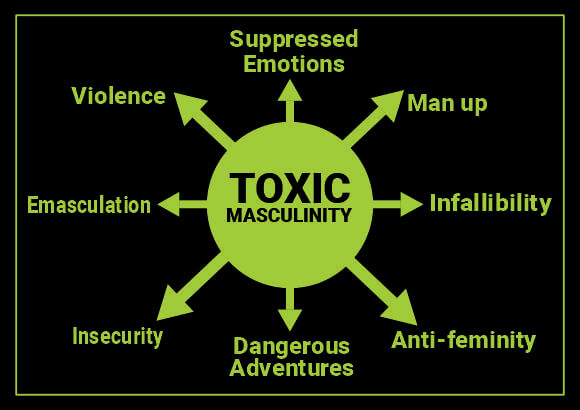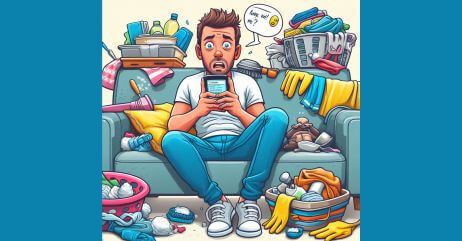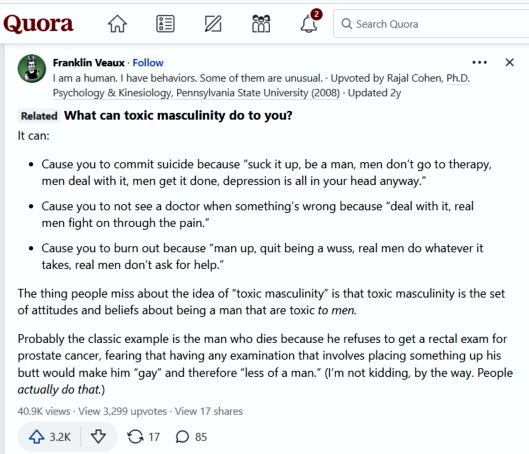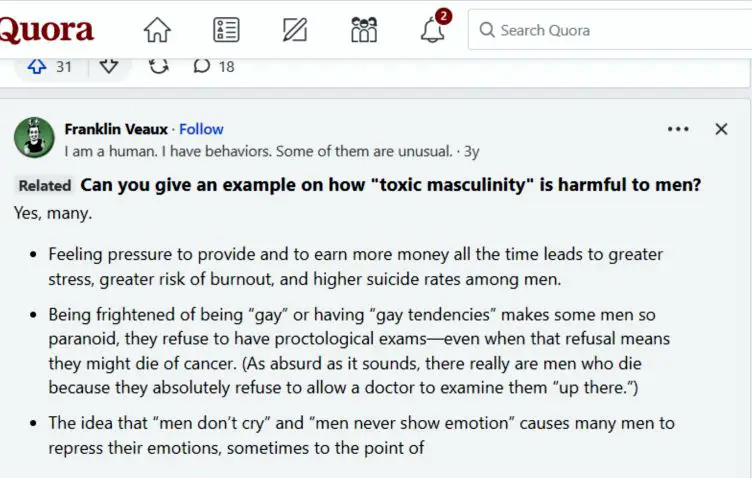Last updated on December 25th, 2024 at 01:44 am
In their quest to prove themselves as real men, some men hurt themselves and others, including society. What is toxic masculinity, and how does it affect you?
It is a topic that has been gaining more attention in recent years. Though it has always been there, society is just getting to be conscious of its dangers as it has been hiding behind “what it means to be a man.”
Masculinity is not bad, often associated with power, strength, courage, and leadership, but it can be toxic. I have always believed that what drives harmful masculinity is the brittle ego of man which almost all the time manifests as strong and tough, but in actual sense, it is fragile and easily bruised.
Trying to fit into the masculine expectation could make a man lose himself, falling into other forms of harmful masculinity like masculine inadequacy.
Modern men have charted a new path for masculinity and abandoned the traditional and overbearing concept of masculinity.
They are giving up aggressive, misogynistic behaviors that harm more than they build.
Man is fragile, but can’t admit it. In his quest to cover up his fragility because it is below his dignity to be fragile, he becomes toxic.
The Conducts of Life
Key Takeaways
- The toxicity of masculinity harms men, women, and society with its emphasis on toughness and power, suppressing emotions and promoting aggression.
- The brittle ego of men drives toxic masculinity, manifesting as strength and dominance but hiding fragility and vulnerability.
- Misunderstandings of toxic manliness can hinder progress, leading to misconceptions of all masculinity being toxic or an attack on masculinity.
- Drivers of toxic masculinity include toughness, anti-femininity, and the pursuit of power, leading to mental health issues, relationship strains, and societal harm.
Related: 5 Reasons Why Women Prefer Beta Males As Partners
Table of Contents
- Key Takeaways
- Toxic Masculinity Meaning
- Drivers of and Causes of Toxic Masculinity
- A Brief History of Toxicity of Masculinity
- How to Identify Toxic Masculinity: 12 Big Signs
- Examples of Toxicity in Men
- Misinterpretations and Misconceptions About Toxic Masculinity
- Addressing Misinterpretations and Providing Counter-narratives
- The Devastating Effects of Toxic Manliness: A Call for Change
- Addressing Toxic Masculinity
- Conclusion
Toxic Masculinity Meaning

According to Medical News Today toxicity of masculinity is a set of behaviors that men exhibit in our society that are detrimental to themselves, women, and society.
It includes the belief and practice that those men must be tough and resilient, dominant, aggressive, and emotionally unavailable to be considered “real men.” And this explains the dangerous quest to become the elusive alpha male.
This belief in toughness with no room for vulnerability for the boy is deeply embedded in cultures and religions.
It’s not bad to be strong and tough as a man, but when it creates a problem for the individual and others or when misused, it becomes a problem.

Related: How to Heal from Wounded Masculine Energy
Related: Developing Positive Masculinity
Drivers of and Causes of Toxic Masculinity

Masculinity accepted in a certain society could be rejected in another. It becomes a shifting concept rather than a fixed parochial one. Time and places can happen and their causes, meaning, and expression change.
Masculinity and the gender role it creates which helps to perpetrate toxic masculinity are influenced by many factors including the following:
- Age
- Race
- Class
- Culture
- Sexuality
- Religion
At the core of toxic masculinity are three key drivers that shape the attitudes and actions of those who adhere to these dangerous ideals.
Let’s take a look:
Toughness: Strength, Aggression, and Emotional Hardening
The emphasis on physical and emotional toughness is a key driver of toxic masculinity, leading men to suppress their emotions and cultivate an aggressive, stoic demeanor.
This can manifest in harmful behaviors and have severe consequences for mental health and interpersonal relationships.
2. Anti-Femininity: Rejecting Feminine Traits and Behaviors
Toxic manliness is characterized by a deep rejection of anything perceived as feminine, including empathy, emotional expression, and nurturing.
Men adhering to these toxic behaviors view these qualities as weak, leading to hostility towards them.
This anti-feminine stance can marginalize women and gender-nonconforming individuals, and suppress healthy emotional expression and connection among men.
3. Power: Tying Men’s Worth to Money, Status, and Influence
At the core of toxic masculinity is the belief that a man’s worth is tied to power, wealth, and status.
This can drive men to ruthlessly pursue material success, dominate others, and feel entitled, leading to abusive and exploitative behaviors that harm both the individual and society.
A Brief History of Toxicity of Masculinity

Toxicity in men in its entire meaning has existed since man came to be. It is as old as man as it plays out in his interaction with society.
However, the term, toxic masculinity originated in the mythopoetic men’s movement of the 1980s and 1990s, where some authors used it to refer to the social pressures placed on men to be aggressive, competitive, independent, and emotionally repressed or bottling up emotions.
These roles were reinforced through social norms and expectations and were often tied to ideas about strength, power, and the dominant male.
The concept later gained wider use in academic and popular discussions to describe aspects of traditional masculinity that are socially destructive, such as misogyny, homophobia, and violent domination.
However, the term has also been criticized for potentially alienating men and oversimplifying complex gender dynamics.
The debate around toxicity in masculinity reflects an unending discussion about the role of masculinity in modern society.
ALSO READ: How to Escape the Nice Guy Syndrome
How to Identify Toxic Masculinity: 12 Big Signs
1. Suppression of Emotions
One of the hallmarks of toxic masculinity is the suppression of emotions and aversion to vulnerability. Men are often socialized to hide their feelings, which can lead to unhealthy coping mechanisms and interpersonal difficulties.
| Tips |
|---|
| To overcome the suppression of emotions in toxic masculinity, individuals must embrace and prioritize emotional literacy. Acknowledging that vulnerability and expressing emotions is not a sign of weakness, but rather a sign of strength in oneself. It may take time and effort to unlearn harmful societal norms, but seeking out counseling or support from peers, loved ones, or mental health professionals can greatly aid in the process. Creating a safe and non-judgmental environment for oneself and others to express emotions is crucial in breaking down toxic masculinity. |
2. Aggression
Toxic masculinity often manifests as aggression, both physical and verbal. Men may feel the need to assert their dominance through hostile behavior, which can create an atmosphere of fear and discomfort.
Related: The Effects of Gender Stereotypes Through The Ages
| Tips Overcoming aggression in toxic masculinity requires addressing the root causes of the behaviors. Men and boys should be taught emotional regulation and communication skills and encouraged to express vulnerability and seek help when needed. Educators, parents, and peers should challenge harmful gender stereotypes and promote healthy masculinity that embraces respect, empathy, and compassion. It’s essential to create safe environments that encourage healthy relationships and discourage harmful behaviors such as bullying, harassment, and violence. |
|---|
| Overcoming aggression in toxic masculinity requires addressing the root causes of the behaviors. Men and boys should be taught emotional regulation and communication skills and encouraged to express vulnerability and seek help when needed. Educators, parents, and peers should challenge harmful gender stereotypes and promote healthy masculinity that embraces respect, empathy, and compassion. It’s essential to create safe environments that encourage healthy relationships and discourage harmful behaviors such as bullying, harassment, and violence. |
3. Objectification of Women
The objectification of women is one of the common signs of toxic masculinity. Men may view women as objects for their pleasure or status, rather than as equal human beings.
This attitude can lead to disrespect, harassment, and even violence towards women.
Suggested: Beta Male Traits And Characteristics
| Tips |
|---|
| Recognize women as equal human beings deserving of respect. Challenge sexist jokes, comments, and behaviors when you encounter them. Educate yourself on gender equality and women’s issues. Speak up against the objectification of women in media and advertising. Treat women with the same dignity and respect you would want for your mother, sister, or daughter. |
Related: The Benefits of Vulnerability in Men
4. Homophobia

One of the big signs of toxic masculinity is homophobia. Toxic masculinity often includes a deep-seated fear and hatred of anything perceived as “unmanly” or “feminine.”
The resultant effect is homophobia, where men feel the need to aggressively assert their heterosexuality and reject or discriminate against LGBTQ+ individuals.
Related: Sigma Male vs Alpha Male
| Tips |
|---|
| Educate yourself about LGBTQ+ identities and experiences. Challenge homophobic language and attitudes in your social circles. Speak up against discrimination and support LGBTQ+ rights. Engage with LGBTQ+ individuals and learn from their perspectives. Reflect on your own biases and work to overcome them. |
Related: The Impact of Masculinity on Society
5. Belittling Others
Belittling others is one of the signs of toxic masculinity that involves a need to feel superior to others, often expressed through belittling or demeaning behavior.
Men may put down women, minorities, or anyone they perceive as weaker to boost their own sense of power and control.
When individuals feel like they have to constantly defend themselves against insults and criticisms, it can be incredibly damaging to their self-esteem and mental health.
Some research has shown that victims of emotional abuse are more likely to experience depression, anxiety, and other mental health issues, as well as physical ailments like chronic pain and digestive problems.
Related: Negative Signs Of A Beta Male In Relationships
| Tips |
|---|
| Reflect on your behavior and its impact on others. Challenge negative stereotypes and promote equality. Communicate respectfully and listen to different perspectives. Surround yourself with positive role models who value respect. Seek help if you struggle with anger or insecurity issues. Promoting healthy relationships, highlighting positive male role models, and tackling harmful stereotypes can challenge the norm of toxic masculinity. |
6. Promiscuity

As one of the signs of toxic masculinity, promiscuity is viewing sexual conquests as a way to prove their manhood.
The effect is promiscuous behavior, objectification of sexual partners, and a lack of respect for boundaries and consent.
This leads to a lack of emotional connection with their partners and can create an unhealthy dynamic in their relationships.
Related: Real Social Dynamics (RSD): Men’s Coach And Their Controversy
| Tips |
|---|
| Reflect on your motivations and values. Seek counseling to address underlying issues. Communicate openly with partners about boundaries and expectations. Prioritize building meaningful connections over casual encounters. Surround yourself with positive role models who demonstrate healthy masculinity. Practice self-compassion and be patient with yourself during the process of change. |
Related: What Is An Alpha Male?
7. Dangerous Risk-taking

Toxic masculinity may drive some men to engage in reckless, dangerous behaviors as a way to demonstrate their strength and bravery.
Activities like excessive drinking, reckless driving, or other high-risk actions are some of the ways it manifests.
This need to prove one’s masculinity through risky behavior can put the individual and others in harm’s way.
| Tips To overcome this, you must redefine and celebrate masculinity to include emotional intelligence, empathy, and vulnerability. Educating men on the importance of balance and healthy expressions of masculinity is crucial. We can challenge harmful beliefs and behaviors by encouraging communication, promoting self-reflection, and providing positive role models. Ultimately, by promoting a more holistic understanding of masculinity, we can create a more inclusive and equitable society. |
|---|
| To overcome this, you must redefine and celebrate masculinity to include emotional intelligence, empathy, and vulnerability. Educating men on the importance of balance and healthy expressions of masculinity is crucial. We can challenge harmful beliefs and behaviours by encouraging communication, promoting self-reflection, and providing positive role models. Ultimately, by promoting a more holistic understanding of masculinity, we can create a more inclusive and equitable society. |
8. Sexual Aggression Towards Women
One of the most disturbing manifestations of toxic masculinity is sexual aggression towards women.
Sexual harassment, assault, or even rape are some of the manifestations. The belief that men are entitled to women’s bodies and that “no” doesn’t mean “no” is a toxic and dangerous mindset that must be challenged.
This type of behavior is harmful and disrespectful, and it can cause severe emotional trauma and long-term damage to a woman’s mental health.
| Tips |
|---|
| Overcoming this toxic behavior requires education, promoting consent and respect, challenging harmful attitudes, and holding individuals accountable for their actions. This includes promoting healthy attitudes and behaviors towards women, challenging harmful gender stereotypes, and creating safe spaces for women to speak out against sexual aggression. It also requires holding perpetrators accountable for their actions through legal and social consequences. |
9. Avoiding Domestic Chores

According to a survey by the Organisation for Economic Co-operation and Development (OECD), women worldwide spend twice as much time as men on unpaid care work, including household chores.
Toxic also shows up with the belief that certain tasks, such as household chores or childcare, are “women’s work” and beneath a man’s dignity.
This can lead to an unequal division of labor in the home and reinforce outdated gender stereotypes that are harmful to both men and women.
Related: Why Vulnerability is Key for Alpha Males And Masculinity
| Tips |
|---|
| Challenge outdated gender norms and take pride in contributing equally to household tasks. Communicate openly with your partner about sharing responsibilities and be willing to learn new skills. Break down chores into manageable steps and create a routine to make them a habit. Celebrate small wins and recognize the importance of your contributions to a well-functioning home. |
10. Misogyny
Misogyny, a hatred or dislike of women, is a manifestation of toxic masculinity.
It stems from the belief that women are inferior to men and should be controlled or subjugated.
Misogyny often leads to discrimination, harassment, and violence against women.
It is a harmful and unacceptable attitude that perpetuates gender inequality and undermines the rights and dignity of women.
It also reinforces harmful gender roles and perpetuates stereotypes that limit both men’s and women’s potential.
| Tips |
|---|
| To overcome misogyny as one of the signs of toxic masculinity, we must challenge and dismantle the underlying beliefs and attitudes that support it. This involves promoting gender equality, challenging harmful gender stereotypes, and holding perpetrators accountable for their actions. Men must recognize the harm caused by misogyny and actively work to promote gender equality in all areas of life. |
11. Penchant for Dominance
Penchant for dominance is the excessive need to assert power, control, and authority over others, often at the expense of empathy, cooperation, and mutual respect.
This behavior is toxic manliness and can manifest in various forms, such as aggression, intimidation, and the suppression of alternative perspectives.
It is considered harmful as it perpetuates gender-based inequalities and can lead to the marginalization and oppression of others.
| Tips |
|---|
| Practice active listening and empathy to understand others’ perspectives. Delegate tasks and empower team members to build trust. Admit mistakes and be open to feedback to foster collaboration. Cultivate patience and flexibility to adapt to changing situations. Seek out diverse opinions and be willing to compromise for better outcomes. |
12. Aversion to Vulnerability
Aversion to vulnerability, a sign of toxic manliness, is the reluctance to express emotions, seek help, or admit weaknesses.
This behavior emanates from the societal pressure on men to appear strong, stoic, and self-sufficient, often at the expense of their well-being.
| Tips |
|---|
| Embrace self-compassion: Recognize that vulnerability is a strength, not a weakness. Start small: Take gradual steps to open up and share your feelings with trusted individuals. Reframe your mindset: View vulnerability as an opportunity for personal growth and deeper connections. Practice self-awareness: Reflect on your fears and insecurities to understand the root causes. |
Related: Habit that Erodes Masculine Energy
Related: Everything About Alpha Male and the Controversy Surrounding it
See a comprehensive article on the manifestation of toxic masculinity.
Examples of Toxicity in Men
Some Quora users have this to say about the effects of toxic masculinity:

Misinterpretations and Misconceptions About Toxic Masculinity

The concept of toxic manliness is often misunderstood and misinterpreted, leading to misconceptions that can hinder meaningful dialogue and progress.
Here are some misconceptions around the term:
1. Assuming All Masculinity is Toxic
One of the most prevalent misconceptions is that toxic masculinity implies that all masculinity is inherently toxic or harmful. This is simply not the case.
It does not mean that all expressions of masculinity are toxic or that masculinity itself is inherently problematic.
It only means that men can capitalize on masculinity to perpetrate dangerous agendas.
2. Thinking It’s an attempt to Emasculate or Eliminate Masculinity
Another common misconception is that discussions around toxic masculinity are an attempt to emasculate men or eliminate masculinity.
This is not the goal of those who use the term.
The aim is to identify and challenge harmful behaviors and attitudes, not to diminish or undermine masculinity as a whole.
3. Questioning Why There is No Discussion of Toxic Femininity
Some critics argue that if we can discuss harmful masculinity, we should also address toxic femininity.
However, this comparison is often misguided.
While certain behaviours and attitudes associated with traditional femininity can be harmful, the term ‘toxic masculinity’ specifically refers to the negative consequences of rigid adherence to traditional masculine norms.
The concept does not imply that all masculinity is toxic, nor does it suggest that femininity is inherently superior.
Related: Building A Strong Family: How To Be A Real Man At Home
Addressing Misinterpretations and Providing Counter-narratives
To address these misinterpretations and misconceptions, it is crucial to provide accurate counter-narratives.
We must emphasize that the term toxic masculinity, is not an attack on men or masculinity as a whole, but rather a recognition of specific harmful behaviors that can negatively impact individuals and society.
The Devastating Effects of Toxic Manliness: A Call for Change

While the toxicity of manliness has been widely discussed, its impact on individuals and society is often underestimated.
The Toll on Men’s Mental and Physical Health
One of the most ignored aspects of harmful manliness is its impact on men’s mental and physical well-being.
The pressure to be tough and suppress emotions can lead to a range of mental health issues, including depression, anxiety, and shame.
Men who adhere to these toxic ideals may find it difficult to express their feelings or seek help when they’re struggling, often leading to a worsening of their condition.
The Strain on Relationships and Social Dynamics
Toxicity in men also takes a toll on interpersonal relationships and social dynamics.
Men who subscribe to these harmful ideals may exhibit controlling and entitled behaviors towards women and marginalized groups, leading to domestic violence, sexual harassment, and other forms of abuse.
This can create an atmosphere of fear, mistrust, and resentment, making it difficult for healthy relationships to thrive.
A Call for Change
Harmful masculinity has devastating consequences for individuals, relationships, and society as a whole.
By standing up to these harmful ideals and sustaining a more inclusive and empathetic understanding of masculinity, we can recreate our society where men feel confident to express their emotions, seek help when needed, and engage in healthy, respectful relationships.
This change starts with each of us. It means challenging the notion that men should see toughness, aggression and the likes as a measure of manliness.
It means celebrating the many ways masculinity can be expressed and recognizing that vulnerability and empathy are not weaknesses, but strengths.
Addressing Toxic Masculinity
While the concept of toxicity in men has been widely discussed, addressing it requires a well-thought-out approach that encourages men to embrace a healthier, more inclusive understanding of masculinity.
1. Encouraging Men to Accept Help and Support: One of the key steps to addressing toxic behaviour in men is encouraging men to seek help and support when needed.
2. Promoting Emotional Expression and Empathy: Another important step in addressing harmful masculinity is promoting emotional expression and empathy among men.
3. Challenging Rigid Gender Norms and Expectations: Addressing this dangerous behaviour also requires challenging the rigid gender norms and expectations that perpetuate these harmful ideals.
Sustaining a More Understanding of Masculinity: Ultimately, addressing toxic masculinity is about fostering a more inclusive and diverse understanding of masculinity that celebrates the unique experiences and expressions of all individuals.
Frequently Asked Questions
What is toxic masculinity?
Toxic masculinity is a set of behaviors men exhibit that are harmful to him and society.
How does toxic masculinity manifest in society?
Harmful masculinity manifests through aggression, suppression of emotions, and the belief that men must be dominant and unemotional.
Why is toxic masculinity harmful?
Harmful masculinity is dangerous as it promotes violence, emotional repression, and unhealthy gender norms that negatively impact individuals and society.
How can we combat toxic masculinity?
We can combat toxicity in manliness by promoting healthy masculinity, emotional intelligence, and gender equality through education, media representation, and policy changes.
Can toxic masculinity be unlearned?
Yes, it can be unlearned through self-awareness, therapy, and embracing a more inclusive and emotionally mature understanding of masculinity.
Conclusion
Toxic masculinity refers to harmful behaviors that men exhibit in society, such as aggression, emotional suppression, and dominance.
It can have negative effects on men’s mental and physical health, relationships, and society as a whole.
Addressing harmful masculinity requires promoting emotional expression, challenging rigid gender norms, and encouraging men to seek help and support.
By redefining masculinity and embracing vulnerability and empathy, we can create a more inclusive and healthy society for all individuals.
REFERENCE
- Why Harmful Masculinity Exponentially Affects Men’s Health And How To Change It
- Talking About “Toxic Manliness
- What are the top 10 Harmful Masculinity behaviours?
- Why Hamrful Masculinity Exponentially Affects Men’s Health
- Time to banish harmful masculinity
- https://www.linkedin.com/pulse/dispelling-myth-toxic-masculinity-embracing-healthy-masculine-ahmed
- https://e-journals.unmul.ac.id/index.php/PSIKO/article/download/7528/pdf
- https://www.verywellmind.com/what-is-toxic-masculinity-5075107
- https://www.healthline.com/health/toxic-masculinity
- 11 Relationship Red Flags You Should Never Ignore
- 15 Relationship Red Flags In A Man To Be Watchful Of
- Seven Signs You Have Succumbed to Toxic Masculinity
- 4 ways toxic masculinity can show up in your relationship
- 15 Deadly Signs of an Immature Man
Pious Clements is the insightful voice behind "The Conducts of Life" blog, where he writes about life ethics, self-development, life mastery, and the dynamics of people and society.
With a profound understanding of human behaviuor and societal dynamics, Pious offers thought-provoking perspectives on ethical living and personal growth.
Through engaging narratives and astute observations, he inspires readers to navigate life's complexities with wisdom and integrity, encouraging a deeper understanding of the human experience and our place within society.

